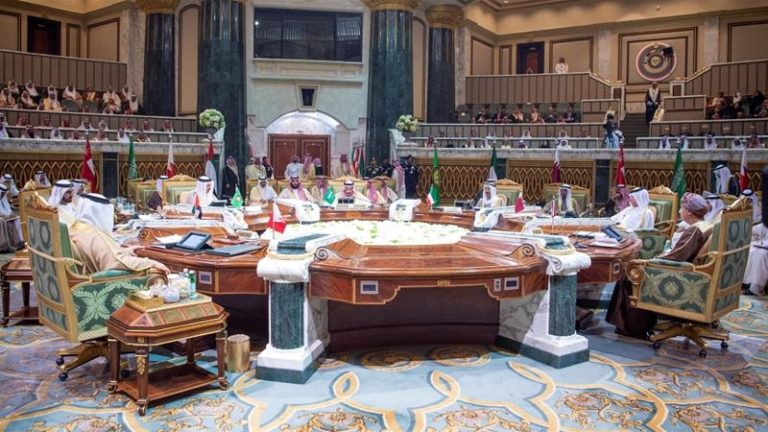The GCC summit against a backdrop of regional crises

The 39th annual Gulf Cooperation Council (GCC) summit took place in Riyadh as the body is ridden with crises including regional disunity, challenges to sovereignty and the diminishing international reputation of Saudi Arabia, the biggest member state.
The GCC, made up of Bahrain, Kuwait, Oman, Qatar, Saudi Arabia, and the UAE, was established in 1981 to foster socioeconomic, security and cultural cooperation in the region.
Yet, in recent years, it has been beset by problems and disputes, raising questions whether it is able to overcome such challenges in the spirit of collaboration.
Speaking from the summit on Sunday, the Emir of Kuwait Sabah Al Ahmad Al Jaber Al Sabah said the GCC must be able to “face the challenges in our region”.
“We need to keep our situation and our stand firm,” he said. “We have faced a lot of challenges, and on top of them, there are the differences between the different GCC nations. We need not risk the interests of our peoples.”
Regional crises
The summit is the second consecutive one held in the shadow of the blockade of Qatar by Saudi Arabia, the United Arab Emirates and Bahrain. Qatar’s Emir Sheikh Tamim bin Hamad Al Thani did not attend but sent his Minister of State for Foreign Affairs Soltan bin Saad Al-Muraikhi to represent the country.
The Qatar blockade, while stuck at an impasse, has had a major economic impact on Gulf investors with the emirate of Dubai particularly affected as property prices and stock indexes have fallen sharply.
Another crisis has been the heightened tensions between the UAE and Oman over Yemen’s southern province of al-Mahra that borders Oman. It is free from the presence of Houthi rebels, yet there are Saudi and UAE forces on the ground there, which Oman considers an infringement on its national security.
There is also the tension between Kuwait and Saudi Arabia over the shared Neutral Zone, which consists of two oil fields – Khafji and Wafra – that are jointly owned by the two states. The oil fields have been closed since 2014 and 2015, respectively, and have the capacity to produce more than 500,000 barrels a day.
The fields would be crucial to Saudi meeting its official production ceiling of 12.5 million bpd of oil if they were to come back online.
The dispute between the two countries centres on the question of the who has sovereignty over the zone, which lies on a portion of the border between them that has been undefined for almost a century.
“We’re trying to convince the Kuwaitis to talk about the sovereignty issues, while continuing to produce until we solve that issue,” Saudi Crown Prince Mohammed bin Salman told Bloomberg in an interview in October.
Saudi Arabia’s predicament
Should the GCC disintegrate, Saudi Arabia would be the biggest loser, primarily because of its role as the largest country in size and resources, as well as the one that stood the most to benefit from the council.
The council has been affected by the oil kingdom’s recent crises, whether stemming from its geopolitical adversary with Iran or conducting unofficial backchannels with the state of Israel.
The assassination of Saudi journalist Jamal Khashoggi in the country’s consulate in Istanbul, Turkey also dealt a blow to Saudi Arabia’s reputation internationally.
The arrest of religious scholars, alleged torture of female activists and dissenters and a weakened economy beg the question of where Saudi Arabia is heading and what repercussions the GCC will face.
Abdullah Baabood, an Omani academic, told Al Jazeera there is rising discontent from Omani citizens regarding the way the GCC “has been managed and manipulated by Saudi Arabia”.
“The people look at what is happening [in terms of Saudi crises] as basically undermining the whole project of the GCC that has been going on now for decades,” Baabood said from Muscat.
“People here in the Gulf want to see a more functional, prosperous GCC that works together,” he continued, adding Saudi Arabia wants to manage the whole GCC and “bully everybody”.
“The damage that has been caused by this crisis is much deeper than people think,” he said. “How can you create a crisis and get everyone to work together?”